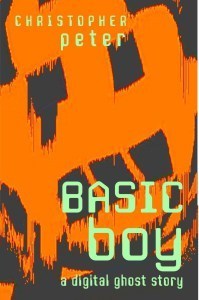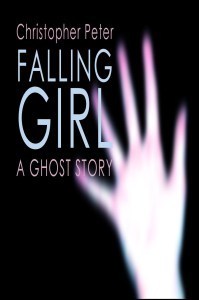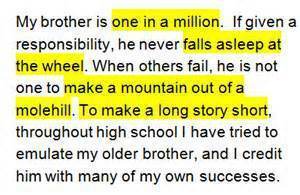Christopher Peter's Blog, page 7
October 23, 2014
BASIC Boy and Falling Girl: free this weekend – with new covers
Last night I got a call from the New York Times. ‘Christopher!’ barked the stressed journalist. ‘Your books are selling so fast, they’re breaking all records! Seriously, we’re thinking of taking them off the best-seller list, just to give everyone else a chance! For crying out loud, stop writing such excessively successful books!!!’
Partly because the above isn’t true, but mostly because I’m an incredibly kind and good-hearted human being – and also, both are ghost stories and it’s nearly Halloween – the Kindle editions of my two novels BASIC Boy and Falling Girl are free on Amazon this weekend, starting tomorrow (Friday 24th October) up to and including Sunday (26th October). Links to US and UK Amazon are at the bottom of this post.
(If you’re reading this after 26th October, don’t despair because (1) Falling Girl is always free on this website anyway, in PDF form, and (2) both books are very reasonably priced. And also available in slightly less reasonably priced paperback form.)
And … after reading some advice on cover design, I’ve slightly revised the cover of both books. I’ve also been giving some thought to the ‘do-it-yourself versus pay someone else’ conundrum. But that’s the subject of a future post.
Amazon links for BASIC Boy:
Amazon links for Falling Girl:


October 21, 2014
Reading: speed or slow?
Have you heard of the slow reading movement? I hadn’t until I came across this article recently. It was in the Wall Street Journal and you need to subscribe or log in to read the whole thing, but here’s a quote:
Slow reading advocates seek a return to the focused reading habits of years gone by, before Google, smartphones and social media started fracturing our time and attention spans. Many of its advocates say they embraced the concept after realizing they couldn’t make it through a book anymore.
“I wasn’t reading fiction the way I used to,” said Meg Williams , a 31-year-old marketing manager for an annual arts festival who started the slow reading club. “I was really sad I’d lost the thing I used to really, really enjoy.”
Apparently there are ‘slow reading clubs’ popping up all over the place quite, er, quickly. And there’s something pleasingly counter-cultural about the whole thing. In these days of reduced attention spans, changing reading habits on electronic devices, blizzards of tweets and sound bites, not to mention the ever-increasing time pressure more and more people find themselves under, the idea of immersing yourself in a good book in quiet companionship with like-minded souls is more than a little appealing. Isn’t reading supposed to be enjoyable, after all? Are we sometimes putting too much pressure on ourselves to read too much, too quickly? So that something that’s supposed to reduce our stress levels actually starts to have the opposite effect?
Funnily enough, a few months back I started on a book about speed-reading – which (just to demonstrate how fickle I can be) also struck me as a thoroughly good idea. After all, writing swallows up huge chunks of time, but us writers are also meant to keep reading too – and since writers generally love books that’s no great hardship, except that too takes yet more time. So the promise of doubling or tripling my reading speed, of being able to devour book after book and still have precious writing (and oh yeah, day job, relationships, food, sleep, etc.) time to spare, is an alluring concept.
However, I never finished the speed reading book (I struggled to find the time – yeah, I know: irony overload) and now I seem to have mislaid it. Ho hum.
So should I be reading fast or slow? I guess it depends on what I’m reading. If it’s non-fiction – if it’s for basically cramming facts into my brain as quickly as possible – then a way of doing that more quickly seems to make a ton of sense. But fiction? That’s more for pleasure. And if I’m reading something really good, lovingly crafted, I’d like to linger over it a bit more. Only if I’m reading something I’m not really enjoying – but still want or need to finish for some reason – would I want to speed up too much.
Bottom line, then, is it depends. I guess I don’t want to worry too much about how slow or quick I’m reading. I’m reluctant to put pressure on myself either way. I need to dig up that speed reading book, finish it and see if it equips me with something useful. But I hope it’s something I’ll be able to switch on or off as the occasion demands. I’d really hate it to rob me of the ability to linger over a good book.
Because when I’m reading a good story, I’m going to try not to dash on to the next page or the end of the chapter too fast. Fiction is made to be enjoyed and appreciated. Who knows, I may even join one of those slow reading clubs one day … but I’m in no hurry.


October 17, 2014
Are clichés always bad?
Writers are often warned against the use of clichés. In fact their prohibition has become so widespread that it’s become – well, a bit of a cliché. My own recent stab at ‘rules’ of writing, in fact, had this at number 9. But what do we really mean by this?
What is a cliché, and why is it usually thought of as a ‘bad thing’ in creative writing? Here’s a definition – a cliché is:
… a trite, stereotyped expression; a sentence or phrase, usually expressing a popular or common thought or idea, that has lost originality, ingenuity, and impact by long overuse,
We can all think of obvious examples. One that springs to my mind is probably the first time someone else pointed it out in my own writing – in an early draft of Falling Girl, I wrote that a startled character looked like ‘… a rabbit caught in headlights …’ That’s a commonly used expression – though sometimes it’s a deer instead of a rabbit, but the exact species doesn’t make much difference. (Mind you, if you substituted ‘elephant’ that might be enough to de-cliché it – except it probably wouldn’t make much sense either …)
Going back to the definition above, the real problem is that ‘… lost originality, ingenuity, and impact …’. We surely want our writing to read as fresh, alive and vibrant. It needs to have impact, not lose it. We want to speak with a distinctive voice, something that stands out. Clichés tend to work against that by making our words sound, instead, like someone else’s. Something that’s been written so many times before, and become stale through sheer repetition.
For example, how about this sparkling prose?:
But (and with rules, there’s often a ‘but’) … I don’t think clichés are always necessarily fatal to good writing. I present as Exhibit A my recent post on ‘Striking Sentences’, where I shared a passage in a book I was reading:
An air vent in the tiny window is held together by masking tape and on the still are some dried flowers in a wobbly clay pot and a wooden cat. A health-and-safety-notice clings to the wall for dear life.
I really liked that passage. I found myself re-reading it several times. To me, it was a fresh, vibrant piece of writing with a dash of humour. It had impact, on me at least. And yet, as my fellow writer and blogger Christine Plouvier pointed out, that phrase ‘clings … for dear life’ is really … a cliché! Oh dear.
But she went on to say (and Christine, I hope you don’t mind me quoting you here but I can’t really put it any better):
Whether or not something is a cliché is in the eye of the beholder … they’re called clichés because they “click” – and that expression “clicked” with you, because it communicated well. Idiomatic expressions distil the essence of language. That’s what makes them beautiful. There’s been too much negative labelling applied to parts of speech and other components of our language’s lexicon. There are no “bad” clichés; like the occasional profanity or ungrammatical construction, they have their place … As you said: right, appropriate and judicious are the keys.
So there we have it. For me, the above passage was not damaged beyond hope by the cliché lurking within in. Perhaps it didn’t help … maybe the author could have used different wording. But it still sounded somehow right in that context. It fit. The passage still struck me as being, basically, good writing.
So there you go. There are exceptions. However, I do still believe that clichés are to be avoided whenever possible, simply because doing so will improve your writing more often than not. Find them, and look for a different, fresher way of saying the same thing. It might take several revisions to weed out all the little blighters. Reading your work out loud will probably help. So will getting someone else to read it – it’s amazing what they will spot that you haven’t. That, of course, applies to a lot more than clichés.
One more point – you can usually get away with using more clichés in dialogue. People often do use them in speech, after all; and it could even be used to define character. If you want to paint someone, for example, as being boring, conventional or unimaginative, you could have them speaking in clichés a lot. That style of speech would be a good way of ‘showing’ rather than ‘telling’ the reader something about them.
So there you go. At the end of the day, clichés can be a real bone of contention; but, if you handle them with kid gloves, you could really strike gold. (See what I did there?)


October 11, 2014
Improving my book: manuscript critique vs beta readers
I wrote last week that I’d finished the second draft of Danny Chaucer’s Flying Saucer, and that my next priority to get some outside input – people who can help me clarify what’s good about it (hopefully something), what could be improved … and what stinks. For me, this step is absolutely critical.
For one thing, I’m reading the book aloud to my two sons. The other thing I’m doing is getting another adult to review the manuscript. I know of two common ways to accomplish this. First, find someone (or more than one person) to be a beta reader. Or, second, to pay for a manuscript critique. I’ve chosen the second option. Why?
Well, there are several reasons:
By choosing an established, reputable literary consultancy (I’m using The Writer’s Workshop) you know you’re getting someone who knows that they’re doing, an experienced editor and/or author who’s been there, done that. WW use a pool of published authors, from which they select the most suitable to review your manuscript.
I’ve used WW before and I’ve always been impressed with the results. You get a pretty detailed report (typically about 8-10 pages) which identifies problem areas, along with suggestions for improvement. There’s always some very perceptive stuff in there. There is usually also some encouraging feedback about those things that do seem to be working.
The report can also give advice on where to go next with the book, post-revisions. My first two books are self-published, and I totally buy in to the ideals of indy publishing. But it’s unavoidably true that most books sell very few copies – and most of the biggest success stories there have tended to be in certain genres. DCFS is a children’s book, and I believe that’s an especially difficult market to succeed in with self-publishing. (If anyone has any views or experience about that, I’d be very interested to hear it.)
I have no doubt whatsoever that Falling Girl and BASIC Boy were much the better for having been critiqued in this way, and for me then implementing the majority of the reports’ recommendations.
Just to clarify one point, however: the critique is not a line-by-line edit, nor a proofread. The WW report is an assessment of the books a whole, including the plot, characterisation, dialogue and general writing quality. If you need a copy-edit or a proofread, that’s a separate thing – and, in my view, a second draft is much too early for that. There’s no point in proofreading something that’s bound to be at least partially, if not extensively re-written.
The most obvious drawback of the critique is the cost, which is dependent on the length of the manuscript. Fortunately DCFS, being a children’s book, is relatively short – the second draft is just under 27,000 words. For that, the WW critique cost just under £300 (i.e. around $500).
For some, of course, spending that might not be an option. You might also take the approach that, if you view self-publishing as a business, how likely are you to earn back the money? Well, if my first two books are anything to go by … probably not.
But then, I don’t view my writing as a business. I’d love it to be, but so far at least I haven’t had the sales to make that a reality. Instead, I see it more as my hobby. Some people have fairly expensive hobbies. They might renovate old cars, play golf or tennis or join a gym; I do less expensive things like running and cycling, and spend the money on improving my writing instead. That way I can justify spending money on things like this.
Of course, I don’t want to waste money, and apart from the critique my costs are minimal. I publish on Amazon, doing layout and design myself. I also do my own proofreading (wisely or not, I’m not completely sure). So manuscript critiques, so far at least, have been my only major expense. I see improving my writing as the area where paying for outside help adds the most value.
Asking for beta readers to review the book would, of course, avoid this expense. But I haven’t gone down that route, at least not this time, for three reasons:
Finding the right beta reader might not be quick or straightforward. Anyone’s opinions are valuable – but some probably more so than others for this purpose. I’d want an experienced editor who knows a lot about about writing for children. In reality, it’s hard to avoid having to pay for that kind of expertise, along with the time and effort involved.
Time. People are busy, writers certainly not excepted. It might take a beta reader some considerable time to get round to doing their review.
If you don’t pay money, there’s bound to be a reciprocal element – i.e. someone reviews your manuscript, and you review theirs. That’s fine, and in many ways I’d like to be able to do that. But at the moment, I’d find it very hard to find the time.
If you can live with and/or mitigate the above drawbacks, then I can see that beta readers would be a good option. Especially if you already have one or two that you know and trust. But for now, for me, for this particular project, the paid critique seemed the better way to go.
Now the question is – will I be brave enough to reveal the feedback (warts and all) on this blog? Of course I will! [crosses fingers …]


October 6, 2014
The ten things I’ve learnt about blogging
This is my 50th post on WordPress. I started about a year ago, so that’s roughly one post per week on average.
First, a confession. My main motivation for starting my blog was that (1) everyone was telling me I should and (2) to help sell my books. I don’t think either were the best reasons by themselves, and I still haven’t sold many books. But here I am, and I like to think I’ve emerged from my first year a little bit wiser and not just older.
So here, in no particular order, are ten lessons I’ve learnt about blogging over the last twelve months or so. Some of these thoughts are quite personal to me and I don’t expect everyone to have drawn exactly the same conclusions, but this is how it seems to me anyway.
The first lesson: It’s all about the people
I’ve seen the light. I admit I didn’t arrive on WordPress necessarily eager to engage with lots of other people. But I have, and I’m much the better for it. You, my fellow bloggers, have taught, encouraged and inspired me, made me laugh, and sometimes all of the above at the same time. Some of you have also made humbled me with your blistering honesty about some of the problems and challenges in your lives. I wish I was that brave.
The second lesson: Be yourself
Everyone is different, and so is every blog. Although it’s good to learn from others, the things I have to say, to contribute, will never be quite like anyone else’s. That doesn’t make them any less valuable, or any more come to that. If I wasn’t here, there’d be a Christopher Peter shaped hole that no-one else could entirely fill. Exactly the same thing applies to each one of you (apart from the Christopher Peter bit obviously).
The third lesson: Give something back
Just as with all writing, quality should be non-negotiable. I’ve received so much from other bloggers, and in return I’d like to at least show them the courtesy of writing posts that have some value, or are thoughtful, or hopefully interesting, or sometimes funny – and always spell-checked. (You realise it’s now inevitable this very paragraph will have a toe-curlingly bad typo in it that I’ve seen right through. You just know it.) Yes, a few of my posts will be about promoting my books, directly or indirectly. But then, I hope those books will bring some enjoyment to those who read them too.
The fourth lesson: Find your focus
Of course, to be yourself you first have to work out who the heck you are. Which isn’t always easy. More to the point, what’s my blog for? I decided pretty early on that it wouldn’t try to be about everything I am. Some people put their whole lives into their blogs, writing about anything and everything, and there’s nothing wrong with that of course, but it wasn’t my aim. I wanted this site to be about me as a writer – my books, ideas, the way I write, what I’ve learnt, my struggles and mistakes, and sometimes opinions and thoughts connected to the world of books and fiction. Occasionally I go off-piste, but I’ve concluded that the tighter I keep to my ‘brief’, the better the site works. Plus, if people decide to follow this blog, at least they’ll know what they’re getting.
The fifth lesson: Thou shalt not take the Like button in vain
… but I’ve decided not to be afraid of using it either. I never press it unless I really have read the post in question – but assuming I have, and can’t think of anything in particular to write by way of a comment, and/or just haven’t got time to – then this is just a good, quick way of expressing appreciation for the time and care the blogger has taken. Usually I really do like it as well. Occasionally I might read something I massively disagree with, and/or can’t really understand, in which case the button remains unpressed; but that’s relatively unusual. Even if I don’t completely agree with what’s been written in every detail, I normally like that it’s been written at all and so a contribution’s been made to a debate. But …
The sixth lesson: Blessed are the commenters
I’m trying to do this more, even if it’s just a quick sentence or too. Who doesn’t like comments on their posts? I certainly appreciate them – unless they’re about hairpieces – as it shows that someone’s taken a bit of extra time and trouble, and I know how busy they probably are because I am too. For that same reason however, I know that, more often than not, a visitor will only have time to press Like. And that’s OK too; but nothing beats a comment.
The seventh lesson: Don’t try to follow the whole world
I appreciate every time someone follows my blog, but I’m also not naïve. I know that motives are often mixed. Sometimes I can see why a particular person has chosen to follow – because I can see, looking at their blog and profile, that we have something in common – often because they’re a writer too. Other times, it’s less clear. And sometimes, it looks very much like they’re amassing followers because they’ve got something to sell. Now don’t get me wrong – there’s nothing wrong with trying to sell something. It would be pretty hypocritical of me to complain when the main reason I started my own blog in the first place was that I hoped more people would read my books. And when I first started getting ‘XYZ is following your blog’ messages, I thought it was only polite to reciprocate and follow their blogs, too.
Now I feel differently. There are only so many hours in the week after all. So when I get a follow, I will always visit the follower’s site. I will read something. But I won’t always follow. And if I don’t, that isn’t an implied criticism of that blog. It isn’t that I don’t think it’s any good. It’s just that I would rather make fewer, more meaningful connections, blogs that I will continue to visit and read and sometimes contribute to, rather than dozens that I will probably never visit again because I just haven’t got the time. Not all the blogs I choose to follow are by other writers (though many are). Some are just interesting, or quirky, or funny, or represent another common interest, or something else. They just aren’t every single blog I visit.
The eighth lesson: Know when to take a break
As I’ve said, there’s never enough time. And that’s the curse of blogging – it can be so darn time-consuming. I still think it’s worth it anyway, but sometimes I have to take a break. Blogging regularly is good, and I try to do that, but sometimes other things have to take priority. Like actually writing books, my family, holidays. Eating, the day job, you know. Stuff.
The ninth lesson: Blessed are the brief
If you’re going to blog regularly, it helps to keep posts brief. Just like I’m not doing now.
The tenth lesson: Keep learning
As with writing books and everything else, I still have much, much more to learn.
So thank you for reading this, and thank you to everyone who’s visited my blog, liked, commented and/or followed.
And here endeth the lessons.


October 3, 2014
Now for the scary bit …
Last week I finished the second draft of my children’s book Danny Chaucer’s Flying Saucer. I’ve previously written how I went about whipping the unkempt mess of the first draft into the slightly less unkempt mess of the second. Now that’s done, it’s time for … the scary bit. (Cue diabolical laugher.)
Up until now, the book has been my secret, inside my head and on a screen that only I’ve seen. All of it – good, bad and indifferent – has been my own special baby. I’ve tried to make it as good as I can, and in reviewing the first draft I genuinely attempted to be as objective and dispassionate as I could about identifying its flaws and areas for improvement, and implementing them. And over the course of writing two novels and absorbing the advice, wisdom and experience of many others (including some of you good people), I believe I know quite a bit about what to look out for and how to make writing better.
My baby has grown and matured. It’s now a teenager – which means (and with apologies to any teenagers reading this, because this obviously doesn’t apply to you) it’s got spots, is frequently confused, has highs and lows; and is generally at that awkward stage of being halfway grown up and knowing a lot more than before, but not as much as it thinks it does …
So I’ve now taken this project just about as far as I can by working completely on my own. Now I need someone else’s input. The second draft is surely better than the first, and (unlike the first) it’s something I feel I can show to someone else without them laughing in my face and then slapping me around the face with it. (Which, let’s be clear, I don’t want when it’s on a laptop.)
But it still has a way to go. There are still things wrong with it, big and small, things that I can’t see because I’ve looked at them too hard and too long. There are still ways it can be improved, things that haven’t occurred to me because I’ve been thinking about it too long and can’t easily step back and look at it as a whole.
I need fresh eyes; and they need to be the eyes of someone I can trust. Someone that will have a completely new and fresh angle on the book, who has expertise and insight. Ideally a market expert. So, for DCFS at this point, that means two things.
First: well, who better to get feedback from than the real experts on children’s books – children? My eldest son is ten, putting him slap-bang in the middle of the target age range. His reading ability is average for his age, and he’s a somewhat reluctant reader. Which makes him a pretty much perfect guinea pig. My youngest is six, meaning he’d struggle to read the book on his own, but I’ll read it to both of them.
Reading out loud is an excellent way of checking how well the prose flows. I did read out some chunks to myself when writing, but to be honest I feel like a bit of a nutcase if I talk to myself too much. Reading the whole thing out loud again to a (hopefully) listening audience will be a good thing.
But just as important – if not more so – is whether the story really engages them. I recently read Neil Gaiman’s excellent Coraline to the two of them, and they hung on every word. When I stopped at the end of each chapter, they begged me to read one more page from the next before finishing. (And I’m pretty sure that wasn’t only to delay going to bed …) If I can get anything like the same reaction from DCFS, I’ll know I’ve got something good.
I’m not expecting a great deal of feedback from them, but any that I can get will be gold dust. The best feedback will be how much it holds their attention. However, I fear my kids are unlikely to deliver a full, detailed critique of concept, plot structure, characterisation or the over-use or otherwise of adverbs. They will know if they like it or not, but not precisely why.
So for a more forensic analysis, I’m paying for a manuscript critique. Next time I’ll talk more about that, and why I’m taking that route instead of asking for beta readers. But for now, it’s goodbye to blogging and hello to the bedtime story … good night!


September 30, 2014
Yet more foolishness re Amazon vs Hachette …
I’ve just read something that made my jaw drop so fast it bounced off the floor and back up again.
It was this New York Times article. Apparently many celebrity writers have joined a group, Authors United, set up by the legendary literary agent Andrew Wylie. This is of course not ‘all’ authors, or anything like, but predominantly the great, good and famous.
I wrote recently about my dismay concerning the determination of many to see the Amazon / Hachette dispute as some simplistic, good vs. evil, black-and-white affair, in which Amazon are totally and obviously the Bad Guys while Hachette are awarded the full benefit of the doubt. The fact that it takes two sides to make a fight, and that we don’t know the full details of the dispute, does not appear to register.
This has now extended to asking the US Justice Department to investigate Amazon for illegal goings-on, monopolistically speaking, on grounds that seem distinctly uncertain.
Just to be clear, by the way, as I stated in my earlier post, I do not believe that Amazon are necessarily totally ‘in the right’ either. Jeff Bezos may very well not be in possession of a white charger, racing to the rescue of the publishing industry, nor sport a dazzling halo. I just don’t think he has horns and a pointy tail either.
Anyway … what drove me to write this post were two quotations within the NY Times article. Because it’s not just been the willingness of some to shoot off various missives of righteous indignation, sometimes in the form of stupidly expensive full-page ads – and all directed at Amazon, mysteriously failing to lob similar pleas and threats at Hachette (I mean, they’re a party to this too, right? Why can’t they back down, if this dispute is supposedly so damaging?)
No, it’s the hyperbolic, bizarre and often frankly ludicrous comments about Amazon being the spawn of Satan and the death-knell of all culture as we know it. That, if they’re not stopped, within ten years we’ll all be illiterates living in caves, grunting helplessly while Mr Bezos urinates on our camp fires. Or something.
You think I’m exaggerating? Well take a look at these two quotes in the NY Times article. First, a gem from Andrew Wylie himself:
“It’s very clear to me, and to those I represent, that what Amazon is doing is very detrimental to the publishing industry and the interests of authors,” the agent said. “If Amazon is not stopped, we are facing the end of literary culture in America.”
Seriously? I mean, seriously? The end of literary culture? Wow. I knew Amazon were a pretty slick operation, but who knew they had that kind of power? (Though only in America apparently? I’m sure Mr Bezos intends nothing less than the total annihilation of all culture globally, thank you very much.)
And another thing – the phrase ‘to those I represent’ is telling. We are talking about those who have done very nicely out of the current system. I can only conclude that Wylie’s definition of ‘literary culture’ is limited to his own elitist little corner of it.
The second quote is even more mind-boggling. It’s from an author called Ursula K. Le Guin. She opines as follows:
“We’re talking about censorship: deliberately making a book hard or impossible to get, ‘disappearing’ an author … Governments use censorship for moral and political ends, justifiable or not. Amazon is using censorship to gain total market control so they can dictate to publishers what they can publish, to authors what they can write, to readers what they can buy. This is more than unjustifiable, it is intolerable.”
I had to read that a couple of times before I could take it in. And I thought, how can an obviously talented (and presumably intelligent) author misuse words, exaggerate and mis-represent so flagrantly? For one thing, Amazon refusing to discount certain titles and not delivering them very quickly amounts to ‘censorship’? Well that’s not how my dictionary defines the word, but I guess Ms Le Guin must be using a different one.
One of the supremely ironic things about all this is that Amazon are being given such a hard time for not discounting Hachette books, when (as is at the same time generally acknowledged) they are fighting for terms that would allow them to discount more than publishers like Hachette generally want them to. You surely don’t have to agree that such discounting is necessarily always a good thing, nor believe that Amazon is doing this for purely altruistic motives, to acknowledge that the anti-Amazon case is mind-bendingly inconsistent on this point.
But back to that last quote – the more I look at it, the more I think it’s not just hysterical. It’s actually offensive. There are many millions of people who are and have been the victims of the most awful tyranny and oppression. Who’ve been lied to through propaganda and censorship, had their civil rights trampled on, and in some cases been ‘disappeared’.
To be ‘disappeared’, I always thought, meant being dragged from your home, away from your family, then tortured and murdered, just for saying the wrong thing. As opposed to, for example, suffering a possible reduction in revenue through not having your book discounted or unavailable for pre-order on Amazon. To draw a comparison between the two, even for the briefest moment, is beyond ludicrous, beyond parody. It’s insulting, and it does no good at all for the cause of authors (and I mean all authors, not just Andrew Wylie’s pals). It doesn’t do much for the cause of truth either – which is something I would hope writers care a little more about.


September 21, 2014
Striking sentences
Do you ever come across a sentence in a book that you find yourself going back and re-reading several times? Because it strikes you in some way as being special – it might be beautifully constructed, amusing, inventive, or just exactly the right sentence for just that place? That happened to me today as I was ready Broadchurch by Erin Kelly. Kelly is already one of my favourite authors – she’s just so good. Below is the sentence that struck me, underlined; I’ve also included the previous one for context.
An air vent in the tiny window is held together by masking tape and on the still are some dried flowers in a wobbly clay pot and a wooden cat. A health-and-safety-notice clings to the wall for dear life.
Why did I like the underlined sentence so much? I think there were three reasons. Firstly, it’s a creative, different way of saying something otherwise banal like ‘there’s a notice on the wall’. Second, there’s a dash of playful, ironic humour in the concept of a health-and-safety notice apparently being afraid and in some kind of danger. And third, it just fits so well. The passage is written in the perspective of a hot-shot city reporter walking into a small-town newspaper office, and she’s casting her sardonic eye across the rather down-at-heel surroundings. It’s the kind of observation such a person might make in that situation.
Perhaps I’m making too much of one little sentence; and probably many others people would find it unremarkable. Just a little thing. But it struck me and I wanted to explore why.
Do you find yourself doing this sometimes, reading and re-reading a phrase, sentence or passage and thinking, ‘wow, now that’s writing.’?


September 20, 2014
And the weirdest comment award goes to …
I’m always delighted to get comments on my blog, and grateful to everyone who takes the time and trouble to make them. Recently however I’ve had a few slightly … strange ones.
Take this one I got last week, a comment on my post, Is Amazon actually evil?:
There are certain factors that needed to be considered while choosing a wig. Wash with specially-formulated wig shampoo and conditioner. These are available in different shades and colors which can perfectly complement with the natural look of your hair.
Now maybe I’m being a tad pedantic, but that doesn’t seem to have an enormous amount to do with the subject of my post. Granted Jeff Bezos is somewhat hirsutely challenged, but even his sternest critics are surely too polite to bring that up, and too sane to seek to connect it with his business practices.
I haven’t clicked on the link accompanying the above comment, but I’ve little doubt that it’s connected to someone in the wig business – a laudable profession I’m sure – and it’s part of some kind of marketing strategy. Well there’s nothing wrong with trying to make a living I suppose. I’m just not convinced I like them using my blog to do so, or that it will do them much good anyway.


September 16, 2014
News just in: the latest promises to Scotland
On this blog I don’t often stray from the world of books and writing; and in particular I tend to run away from the poisonous morass of politics faster than Jeff Bezos from a French bookstore convention. However, this week is different, because this Thursday, 18th September, the residents of Scotland will vote in their independence referendum. If they vote yes, it will mean the end of the United Kingdom in its current form. And as a resident of the UK, I do have an opinion on that – even though, in common with the vast majority of its citizens, I am not being consulted.
From the start I have been a unionist. I hope that Scotland will stay. I think that the United Kingdom of Great Britain and Northern Ireland has, by most measures, been an extraordinarily successful and influential union of nations during the three hundred or so years since the crowns of England and Scotland were united. Scotland has made a very big contribution to all that. And in this increasingly dangerous and uncertain world, I strongly believe that we are better and stronger, and can make a more positive contribution to the world, if we stay together.
I also have grave doubts about Scotland’s independent future, for all sorts of boring economic reasons I won’t go into here. And finally, I think it’s very clear they are being systematically manipulated and lied to by the nationalist leader Alex Salmond, a man slimier than a bucketful of eels.
I know and have met many Scots people, and almost without exception they have been truly lovely human beings. A few aren’t, no doubt, but that’s true of every nationality. However, many in the Scottish Nationalist movement appear to be attempting to set a new world record for sheer whiney obnoxiousness. As an Englishman I am bemused and saddened by the thinly-disguised (or often not at all disguised) torrent of anti-English bile pouring down from north of the border. Now my distant ancestors might once have invaded Scotland. But I have never even attempted such a thing personally, even when drunk.
Many of us might call this nasty strain of nationalism by its proper name: racism.
(Incidentally, a thousand years or so back those naughty Scandinavians were regularly pillaging, burning and raping their way down England’s east coast. However I’ve decided to forgive them, and will not after all be boycotting IKEA. I’m very forgiving like that.)
The fact is, when Scotland was saddled with those nasty English oppressors three centuries ago, we English were also saddled with them. We were saddled with each other. It’s called a family I believe.
However … despite always hoping that Scotland would refrain from hurling themselves head-first into a (in my humble opinion) hugely risky and ludicrously irrational ‘yes’ pit on Thursday, I’m starting to seriously wonder if the ‘be careful what you wish for’ maxim isn’t applicable here. The reason? UK’s illustrious politicians, from the Prime Minister down, are falling over themselves to promise more and more to Scotland if they vote no. And in my opinion they are starting to cross a line in so doing.
The latest promise is to guarantee – apparently forever and a day – the ‘Barnett formula’, which sounds very boring and it is, except that it will perpetuate the current situation where Scotland receives more money per capita than England or anywhere else in the UK. As far as I can tell, the Barnett formula was worked out on the back of a fag packet, which is where it belongs.
The other main thing is the so-called ‘devo max’, where the devolved Scottish government will be given even more self-governing powers. But at the same time, there are no firm plans to tackle the situation whereby Scottish MPs in the UK Parliament will get to vote on matters of tax and spending affecting England and the rest of the UK, while the reverse is not true. It’s called ‘having your cake and eating it’, to deploy the sort of cliché that writers are supposed to avoid. Quite where that leaves the rest of the UK, or when and if the English, Welsh and Northern Irish are ever going to get a say on what look like very significant and hastily-thrown-together changes to the government and constitution of our country … well your guess is as good as mine.
So, I thought, why stop there? What else can we promise Scotland if it would condescend to stay in the UK and put up with the rest of us? Well actually I have just intercepted a top-secret e-mail from David Cameron, outlining a text of a speech he plans to deliver on Wednesday. It includes the following additional promises:
The voters of England promise never again to vote Conservative, so the Scots won’t have to put up with being governed by a party they don’t like just because that’s democracy or something.
Not only will Scotland continue to get more tax revenues per head than the rest of the UK, but the residents of England, Wales and Northern Ireland hereby promise to pay an annual tribute to Scotland consisting of one-quarter of their salaries, a kilo of cheese, and one goat.
And one gallon of oil, to make up for all the North Sea oil we stole – on the flimsy pretext that we’re all in the same country – and then gave nothing in return apart from a bigger share of tax revenues than anyone else (see above).
The people of England will promise, on at least thirty days in a year, to wear t-shirts bearing the slogan, ‘Look, we’re really sorry about Culloden, OK? And those other battles. Yes, it was a long time ago, but really we were utterly beastly to you and there’s no excuse.’
(But at the same time we promise to forget about the Scottish raiding parties that pillaged parts of Northern England. Because that was different, obviously.)
Whilst doing the above, the said people of England will ritually flagellate themselves with sticks.
Every English family will give their firstborn child to Scotland, so that these children can become true Scots which apparently means having their faces painted blue and shouting about Culloden and the nasty English oppressors and stuff like that.
Welsh and Northern Irish families can, in lieu of their firstborn, just give another goat. You can never have enough goats.
And other stuff when we think of it.
Scottish football supporters can come to Wembley stadium, invade the pitch and wreck it.
Oh wait … that already happened …
Seriously though Scotland – I still hope you stay. Just remember it’s not all about you.


















